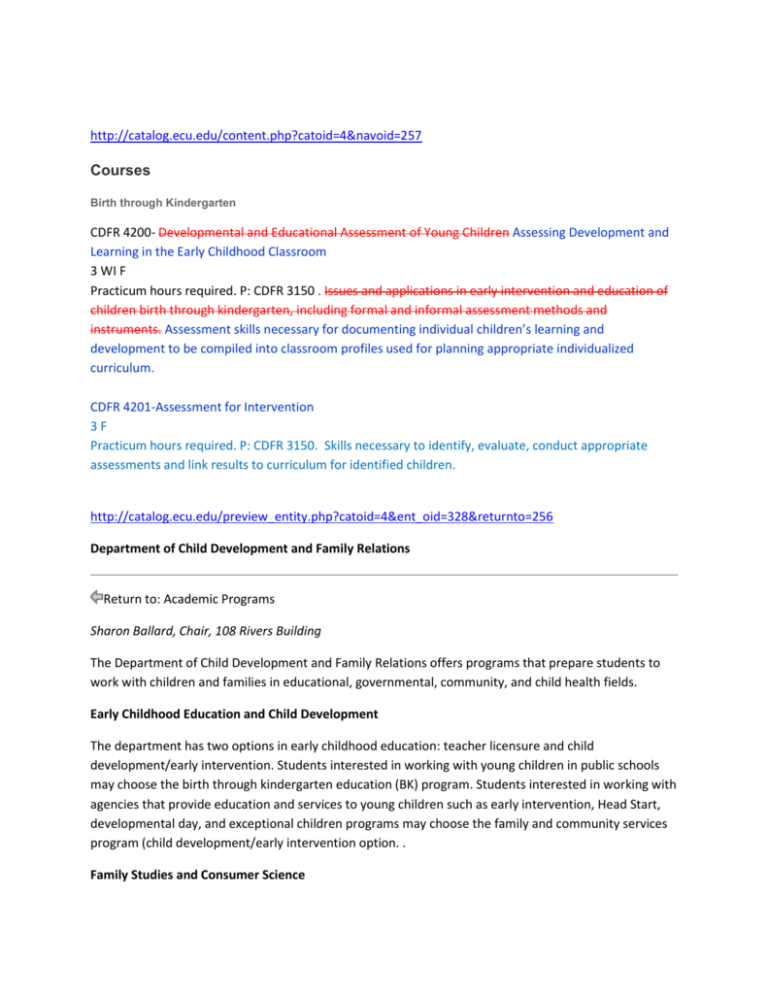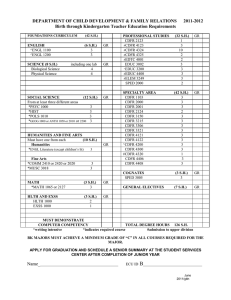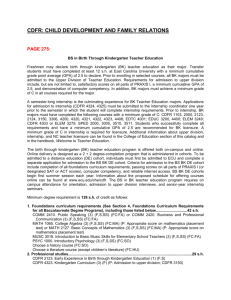revised - East Carolina University
advertisement

http://catalog.ecu.edu/content.php?catoid=4&navoid=257 Courses Birth through Kindergarten CDFR 4200- Developmental and Educational Assessment of Young Children Assessing Development and Learning in the Early Childhood Classroom 3 WI F Practicum hours required. P: CDFR 3150 . Issues and applications in early intervention and education of children birth through kindergarten, including formal and informal assessment methods and instruments. Assessment skills necessary for documenting individual children’s learning and development to be compiled into classroom profiles used for planning appropriate individualized curriculum. CDFR 4201-Assessment for Intervention 3F Practicum hours required. P: CDFR 3150. Skills necessary to identify, evaluate, conduct appropriate assessments and link results to curriculum for identified children. http://catalog.ecu.edu/preview_entity.php?catoid=4&ent_oid=328&returnto=256 Department of Child Development and Family Relations Return to: Academic Programs Sharon Ballard, Chair, 108 Rivers Building The Department of Child Development and Family Relations offers programs that prepare students to work with children and families in educational, governmental, community, and child health fields. Early Childhood Education and Child Development The department has two options in early childhood education: teacher licensure and child development/early intervention. Students interested in working with young children in public schools may choose the birth through kindergarten education (BK) program. Students interested in working with agencies that provide education and services to young children such as early intervention, Head Start, developmental day, and exceptional children programs may choose the family and community services program (child development/early intervention option. . Family Studies and Consumer Science The department has two options in family studies. Students interested in teaching about children, families, and consumer issues in middle and high schools may chose the family and consumer science education program. Students interested in working with families in community, governmental, and family services programs may consider the family and community services program (family studies option). Students complete course work in partial fulfillment of the Family Life Education Certification from the National Council on Family Relations, the Infant-Toddler Program Personnel Certification from the NC Department of Health and Human Services, Child Life Certification from the Association for the Care of Children’s Health, and teacher licensure in family and consumer sciences education and birthkindergarten teacher education from the North Carolina Department of Public Instruction. Programs Bachelor’s Birth Through Kindergarten Teacher Education, BS Child Life, BS Family and Community Services, BS Family and Consumer Sciences Education, BS Minor Child Development and Family Relations Minor Courses Child Development and Family Relations CDFR 1103 - Marriage and Family Relations CDFR 2000 - Child Development I: Prenatal Through Early Childhood CDFR 2001 - Child Development II: Middle Childhood Through Young Adulthood CDFR 2021 - Introduction to Child Life CDFR 2123 - Early Experience in Birth through Kindergarten Education CDFR 2124 - Interaction Techniques for Working with Young Children CDFR 2280 - Introduction to Child, Family, and Community Services CDFR 2400 - Introduction to Gerontology CDFR 3002 - Child in the Family CDFR 3022 - Death, Dying, and Bereavement CDFR 3150 - Introduction to Early Childhood Intervention CDFR 3210 - Models and Foundations of Early Childhood Education CDFR 3215 - The Family As Consumers CDFR 3290 - Theory and Practice in Family and Community Services CDFR 3306 - Guiding Children’s Behavior CDFR 3321 - Infant and Toddler Curriculum CDFR 3400 - Current Issues in Early Childhood Education CDFR 3413 - The Hospitalized Child CDFR 4000 - Introduction to Child and Family Research CDFR 4001 - Community Services Internship CDFR 4002 - Child Development: Early Intervention Internship CDFR 4006 - Families, Sexuality, and Gender Roles CDFR 4007 - Public Policy and Legal Issues Affecting Families CDFR 4100 - Study Abroad in CDFR CDFR 4121 - Social Studies, Math, and Science Curriculum in Early Childhood CDFR 4122 - Language and Literacy Curriculum in Early Childhood CDFR 4123 - Learning Environments and Teaching Methods in Early Childhood Education CDFR 4200 - Developmental and Educational Assessment of Young Children Assessing Development and Learning in the Early Childhood Classroom CDFR 4201-Assessment for Intervention CDFR 4210 - Child Life Practicum CDFR 4300 - Birth through Kindergarten Curriculum Adaptations for Diverse Learners CDFR 4303 - Families and Cultural Diversity CDFR 4313 - Trends and Issues in Family Studies CDFR 4320 - Practicum in Teaching Birth-Kindergarten in the Public Schools CDFR 4324 - Internship in Birth Through Kindergarten Education CDFR 4325 - Internship Seminar: Issues in Birth-Kindergarten Education CDFR 4366 - Family Life Education CDFR 4390 - Family Resource Management CDFR 4406 - Parent-Professional Collaboration CDFR 4408 - Administration of Programs for Young Children CDFR 4410 - Professional Seminar CDFR 4415 - Child Life Internship CDFR 4500 - Independent Study CDFR 4521 - Research, Teaching, and Leadership Experiences in CDFR CDFR 4611 - Counseling Elders and Their Families CDFR 4612 - Family Crises and Resources CDFR 4993 - Early Childhood Practicum CDFR 5004 - Special Topics in Child Development and Family Relations CDFR 5005 - Special Topics in Child Development and Family Relations CDFR 5006 - Special Topics in Child Development and Family Relations CDFR 5403 - Parent Education CDFR 5411 - Counseling Elders and Their Families CDFR 5412 - Family Crises and Resources CDFR 5420 - Family Intervention Models CDFR 5901 - Readings in Aging Studies CDFR 5902 - Readings in Aging Studies CDFR 5903 - Readings in Aging Studies CDFR 5992 - Advanced Preschool Internship CDFR 5993 - Advanced Preschool Internship Child Development and Family Relations Banked Courses CDFR 3100 - Resource Management for the Elderly CDFR 4998 - Preschool Practicum CDFR 4999 - Preschool Practicum CDFR 5336 - Methods of Teaching Personal and Family Living CDFR 5392 - Economic Problems CDFR 5400 - Seminar in Aging Studies CDFR 5410 - Gerontology: Developing the Living Environment Family and Consumer Sciences FACS 1180 - Housing and Interior Design FACS 2123 - Early Experience in Family and Consumer Sciences Education FACS 2380 - Apparel and Textiles for Family and Consumer Sciences FACS 4317 - Curriculum Development FACS 4323 - Methods of Teaching Family and Consumer Sciences FACS 4324 - Internship in Family and Consumer Sciences Education FACS 4325 - Internship Seminar: Issues in Family and Consumer Sciences Education FACS 5007 - Special Problems in Family and Consumer Sciences Education Family and Consumer Sciences Banked Courses FACS 4400 - Professional Presentations FACS 4410 - Professional Seminar FACS 4411 - Professional Internship FACS 5300 - Middle Grades Career Exploration: Service Clusters http://catalog.ecu.edu/preview_program.php?catoid=4&poid=685&returnto=250 Birth Through Kindergarten Teacher Education, BS Return to: Undergraduate Majors, Minors and Certificates Freshmen may declare birth through kindergarten (BK) teacher education as their major. Transfer students must have completed at least 12 s.h. at East Carolina University with a minimum cumulative grade point average (GPA) of 2.5 to declare. Prior to enrolling in selected courses, all BK majors must be admitted to the Upper Division of Teacher Education. Requirements for admission to upper division include, but are not limited to, satisfactory scores on all parts of PRAXIS I, a minimum cumulative GPA of 2.5, and demonstration of computer competency. In addition, BK majors must achieve a minimum grade of C (2.0) in all courses required for the major. Students earning less than a C (2.0) in a prerequisite major course must repeat the course before the subsequent upper-level course may be taken. A semester-long internship is the culminating experience for BK Teacher Education majors. Applications for admission to internship (CDFR 4324, 4325) must be submitted to the internship coordinator one year prior to the semester in which the student will complete internship requirements. Prior to internship, BK majors must have completed the following courses with a minimum grade of C (2.0): CDFR 1103, 2000, 2001, 2123, 2124, 3150, 3215, 3306, 3321, 4121, 4122, 4123, 4200, 4201, 4300, 4320; EDTC 4001; EDUC 3002, 3200, 4400; READ 3301; SPED 2000, 3005. Students who successfully complete all requirements and have a minimum cumulative GPA of 2.5 are recommended for BK licensure. A minimum grade of C (2.0) in internship is required for licensure. Additional information about upper division, internship, and NC teacher licensure can be found in the College of Education section of this catalog and in the handbook, Welcome to Teacher Education. The birth through kindergarten (BK) teacher education program is offered both on-campus and online. Online delivery is designed as a 2 + 2 degree-completion program that is administered in cohorts. To be admitted to a distance education (DE) cohort, individuals must first be admitted to ECU and contact the DE coordinator for admission to the BS BK DE cohort. Criteria for admission to the BS BK DE cohort include completion of all foundations curriculum requirements, passing scores on all parts of PRAXIS I (or designated SAT or ACT scores,) computer competency, and reliable Internet access. BS BK DE cohorts begin fall semester each year. Information about the proposed schedule for offering courses online can be found at www.ecu.edu/che/cdfr. The BS in BK teacher education program requires on-campus attendance for orientation, admission to upper division interviews, and senior-year internship seminars. Minimum degree requirement is 126 123 s.h. of credit as follows: 1. Foundations curriculum requirements including those listed below - 42 s.h. (For information about courses that carry foundations curriculum credit see Liberal Arts Foundations Curriculum ) ANTH 1050 - Global Understanding or ANTH 2010 - Societies Around the World or ANTH 2200 - Introduction to Cultural Anthropology or GEOG 1000 - People, Places, and Environments COMM 2020 - Fundamentals of Speech Communication or COMM 2410 - Public Speaking or COMM 2420 - Business and Professional Communication MATH 1065 - College Algebra or MATH 2127 - Basic Concepts of Mathematics MUSC 3018 - Introduction to Basic Music Skills for Elementary School Teachers POLS 1010 - National Government PSYC 1000 - Introductory Psychology Choose a biological science (FC:SC) Choose a history course (FC:SO) Choose a literature course (except children’s literature) (FC:HU) Choose a physical science (FC:SC) 2. Professional studies - 32 s.h. CDFR 2123 - Early Experience in Birth through Kindergarten Education CDFR 4123 - Learning Environments and Teaching Methods in Early Childhood Education CDFR 4324 - Internship in Birth Through Kindergarten Education CDFR 4325 - Internship Seminar: Issues in Birth-Kindergarten Education EDTC 4001 - Technology in Education EDUC 3002 - Introduction to Diversity EDUC 3200 - Foundations of American Education EDUC 4400 - Foundations of School Learning, Motivation, and Assessment or PSYC 4305 - Educational Psychology READ 3301 - Reading Instruction in the Primary Grades SPED 2000 - Introduction to Exceptional Children 3. Specialty area studies - 42 s.h. CDFR 1103 - Marriage and Family Relations CDFR 2000 - Child Development I: Prenatal Through Early Childhood CDFR 2001 - Child Development II: Middle Childhood Through Young Adulthood CDFR 2124 - Interaction Techniques for Working with Young Children CDFR 3150 - Introduction to Early Childhood Intervention CDFR 3215 - The Family As Consumers CDFR 3306 - Guiding Children’s Behavior CDFR 3321 - Infant and Toddler Curriculum CDFR 4121 - Social Studies, Math, and Science Curriculum in Early Childhood CDFR 4122 - Language and Literacy Curriculum in Early Childhood CDFR 4200 - Developmental and Educational Assessment of Young Children Assessing Development and Learning in the Early Childhood Classroom CDFR 4201-Assessment for Intervention CDFR 4300 - Birth through Kindergarten Curriculum Adaptations for Diverse Learners CDFR 4320 - Practicum in Teaching Birth-Kindergarten in the Public Schools CDFR 4406 - Parent-Professional Collaboration CDFR 4408 - Administration of Programs for Young Children 4. Cognates - 3 s.h. SPED 3005 - Instructional Programming in Special Education 4. Advisor approved electives to complete requirements for graduation. Return to: Undergraduate Majors, Minors and Certificates http://catalog.ecu.edu/preview_program.php?catoid=4&poid=835&returnto=250 Child Life, BS Acceptance into this major is on a competitive, space-available basis with admission each year prior to fall semester. To be admitted into the child life program, an application packet must be submitted to the child life program coordinator after the student has completed a minimum of 45 semester hours, including the following courses with a minimum grade of B (3.0) or better: CDFR 2000 , CDFR 2001 , CDFR 2021 , CDFR 3002 , CDFR 3150 ; NUTR 1000 ; and an overall GPA of at least B (3.0). To remain in the program, students must maintain a 3.0 GPA with a minimum grade of B (3.0) in the following courses prior to internship (CDFR 4415 ): CDFR 3022, CDFR 3321, CDFR 3413 , CDFR 3022 , CDFR 4200 CDFR 4201, CDFR 4210 , CDFR 4303 , CDFR 4410 , CDFR 4993 . Students must have a minimum 3.0 GPA to enroll in the child life internship (CDFR 4415 ) and earn a minimum grade of B (3.0) in CDFR 4415 to graduate as a child life major. Internships are nationally competitive, require formal application to the desired hospital or health care setting and typically need to be arranged one semester before enrollment. Students are responsible for interviewing and securing their own internship. (Note: Completion of a BS degree with a major in child life does not include certification as a child life specialist. The Child Life Certifying Committee of the Child Life Council oversees the administration of the certification examination. The Department of Child Development and Family Relations will verify completion of degree requirements, but meeting other requirements for certification is the responsibility of each candidate.) In addition, child life internships are only available to students enrolled in a degree completion program. Application Process to child life major (criteria listed above) An application packet with the following items must be submitted to the child life program coordinator no later than the last Friday of March each academic year. Completed application Typed one-page (double-spaced) statement of purpose regarding why you would like to be admitted to ECU’s child life program Two to three letters of recommendation from faculty outside the child life Program Curriculum vitae or resume Official transcript of undergraduate work Two or three selected examples of writing assignments Documentation of a minimum of 50 volunteer hours and/or practicum hours working with children in a medical setting (ex. hospital, camp, clinic, etc.) The faculty review committee will evaluate student applications on the basis of academic achievement and the “Standards for Academic and Clinical Preparation for Programs in Child Life” published by the Child Life Council, the governing board for the profession. These standards include: strong personal qualities appropriate for relating to children, families, peers, supervisors, and others good to excellent evaluations in practicum experiences strengths in writing and speaking skills in observation and documentation team communication and relationship skills Minimum degree requirement is 126 s.h. of credit as follows. 1. Foundations curriculum requirements including those listed below - 42 s.h. (For information about courses that carry foundations curriculum credit see Liberal Arts Foundations Curriculum ) BIOL 2130 - Survey of Human Physiology and Anatomy COMM 2020 - Fundamentals of Speech Communication or COMM 2410 - Public Speaking or COMM 2420 - Business and Professional Communication MUSC 3018 - Introduction to Basic Music Skills for Elementary School Teachers PSYC 1000 - Introductory Psychology SOCI 2110 - Introduction to Sociology 2. Core - 57 s.h. CDFR 1103 - Marriage and Family Relations CDFR 2000 - Child Development I: Prenatal Through Early Childhood CDFR 2001 - Child Development II: Middle Childhood Through Young Adulthood CDFR 2021 - Introduction to Child Life CDFR 3002 - Child in the Family CDFR 3022 - Death, Dying, and Bereavement CDFR 3150 - Introduction to Early Childhood Intervention CDFR 3321 - Infant and Toddler Curriculum CDFR 3413 - The Hospitalized Child CDFR 4200 - Developmental and Educational Assessment of Young Children Assessing Development and Learning in the Early Childhood Classroom. CDFR 4201-Assessment for Intervention CDFR 4210 - Child Life Practicum CDFR 4303 - Families and Cultural Diversity CDFR 4410 - Professional Seminar CDFR 4415 - Child Life Internship CDFR 4993 - Early Childhood Practicum NUTR 1000 - Contemporary Nutrition 3 s.h. advisor-approved electives 3. Cognates - 6 s.h. HIMA 3000 - Medical Terminology for Health Professionals PSYC 2201 - Psychology of Childhood 4. Restricted electives - 9 s.h. (Choose from the following.) ANTH 1050 - Global Understanding ANTH 3252 - Medical Anthropology or SOCI 3327 - Introductory Medical Sociology ART 3850 - Art in the Elementary School ASLS 2020 - Sign Language Studies I CSDI 2100 - Introduction to Communication Disorders CSDI 3020 - Language Development ENGL 4950 - Literature for Children HLTH 2125 - Safety Education and First Aid HLTH 2126 - Safety Education and First Aid LIBS 3200 - The Art of Storytelling MUSC 3028 - Music Education in Elementary Grades MUSC 3048 - Music for Exceptional Children MUSC 3058 - Music for the Preschool Child MUSC 4277 - Music for Group Activities MUSC 4287 - Music for Group Activities Practicum PSYC 5380 - Psychology of the Exceptional Child RCLS 2000 - Foundations of Recreation, Parks, and Tourism Studies SPAN 2117 - Spanish for Professions SPED 2000 - Introduction to Exceptional Children 5. Electives to complete requirements for graduation. http://catalog.ecu.edu/preview_program.php?catoid=4&poid=837&returnto=250 Family and Community Services, BS Return to: Undergraduate Majors, Minors and Certificates Freshmen may declare family and community services as their major. The family and community services program is also offered on campus in the 2 + 2 degree-completion format. Students must achieve and maintain a cumulative 2.5 GPA to remain in the program. Transfer students must have completed at least 12 s.h. at East Carolina University and a minimum GPA of 2.5 to declare. In addition, students must achieve a minimum grade of C (2.0) in all CDFR courses required for the major. Students earning less than a C (2.0) in a prerequisite major course must repeat the course before the subsequent upper level course may be taken. Students in Family Community Services may select one of two options: family studies or child development/early intervention. The family studies option is intended for those interested in work with community agencies that provide a broad array of services to families. The child development/early intervention option is intended for those interested in work with community agencies that provide a variety of services to children ages birth through eight years. (Note: Students who meet course requirements for the certification in family life education must make application to the National Council on Family Relations. The Department of Child Development and Family Relations will verify completion of degree requirements, but meeting other requirements for certification is the responsibility of each student.) Minimum degree requirement is 126 s.h. of credit as follows: 1. Foundations curriculum requirements including those listed below - 42 s.h. (For information about courses that carry foundations curriculum credit see Liberal Arts Foundations Curriculum ) COMM 2410 - Public Speaking or COMM 2420 - Business and Professional Communication or COMM 2020 - Fundamentals of Speech Communication PSYC 1000 - Introductory Psychology 2. Core - 25 s.h. CDFR 1103 - Marriage and Family Relations CDFR 2000 - Child Development I: Prenatal Through Early Childhood CDFR 2280 - Introduction to Child, Family, and Community Services CDFR 3002 - Child in the Family CDFR 3290 - Theory and Practice in Family and Community Services CDFR 4000 - Introduction to Child and Family Research CDFR 4303 - Families and Cultural Diversity CDFR 4366 - Family Life Education CDFR 4410 - Professional Seminar 3. Choose one of the following options: Family Studies or Child Development/Early Intevention Family Studies Option - 35 s.h. CDFR 2001 - Child Development II: Middle Childhood Through Young Adulthood CDFR 2400 - Introduction to Gerontology CDFR 3215 - The Family As Consumers CDFR 4001 - Community Services Internship CDFR 4006 - Families, Sexuality, and Gender Roles CDFR 4007 - Public Policy and Legal Issues Affecting Families CDFR 4313 - Trends and Issues in Family Studies CDFR 4390 - Family Resource Management 5 s.h. of advisor-approved CDFR electives Child Development/Early Intervention Option - 35 s.h. CDFR 2124 - Interaction Techniques for Working with Young Children CDFR 3150 - Introduction to Early Childhood Intervention CDFR 3306 - Guiding Children’s Behavior CDFR 3321 - Infant and Toddler Curriculum CDFR 4002 - Child Development: Early Intervention Internship CDFR 4121 - Social Studies, Math, and Science Curriculum in Early Childhood or CDFR 4122 - Language and Literacy Curriculum in Early Childhood CDFR 4200 - Developmental and Educational Assessment of Young Children Assessing Development and Learning in the Early Childhood Classroom. CDFR 4201-Assessment for Intervention CDFR 4300 - Birth through Kindergarten Curriculum Adaptations for Diverse Learners CDFR 4406 - Parent-Professional Collaboration CDFR 4408 - Administration of Programs for Young Children 4. Minor/Structured Electives - 24 s.h.









